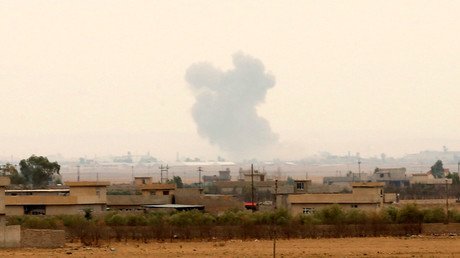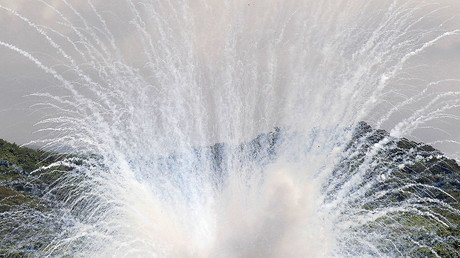‘Burns to the bone’: Amnesty Int’l warns white phosphorus used in Mosul may cause civilian suffering
White phosphorus munitions used in Islamic State-held Mosul by Iraqi forces pose a grave danger to civilians, as their scattered remains can cause horrific burns all the way to the bones, a senior Amnesty International adviser told RT.
While white phosphorous is said to be a useful tool aiding the Iraqi forces during their advance on Islamic State (IS, ISIS/ISIL) stronghold of Mosul, it may cause more harm than good on the ground, Donatella Rovera, senior crisis response adviser at Amnesty International, told RT.
People trapped in Mosul are likely to start fleeing the city, taking the eastern road covered with half-burned white phosphorous munitions which may ignite again and hurt civilians who come into contact with the chemical.
“We are aware that civilians face tremendous risks from ISIS, of being caught in the middle of the fighting. There are mines planted by ISIS. [But our concern is] that civilians leaving Mosul eastward may get hurt by parts of white phosphorus munitions,” Rovera said.
White phosphorus can leave severe burns, penetrating through the skin, muscles and bones, she explained.
The adviser noted that the use of the toxic weapon was seemingly justified, but the manner in which the substance is being used sparks concerns.
“White phosphorous wasn’t used in the area with civilians at present… Our concern is about the possibility of civilians coming through that particular area,” she added.
On Friday, upon receiving the information on the use of the weapon inside and outside Mosul, the human rights watchdog called on the Iraqi government and its US-backed allies to stop using white phosphorus not only the vicinity of civilians, but also in other areas unless “it is absolutely necessary.” The civilian population should also be duly notified, Amnesty said.
When asked if Amnesty International was concerned over the possibility of the chemical weapon falling into the hands of Islamic State militants, Rovera replied there has been no evidence that events could take this kind of turn.
“That would be a completely different scenario,” Rovera said, noting again that for now the organization remains focused on the safety of Mosul’s residents.
“We must ensure that white phosphorous is used in a manner that could not present a danger to civilians,” she stressed.
Iraqi forces joined by allied militias and backed by the US-led coalition launched the offensive to retake Mosul on October 17. Around 100,000 people have been displaced since then, while 1.5 million more remain trapped inside the city. The UN cited reports saying that Islamic State militants have driven “tens of thousands” of civilian hostages to Mosul to use them as human shields.














